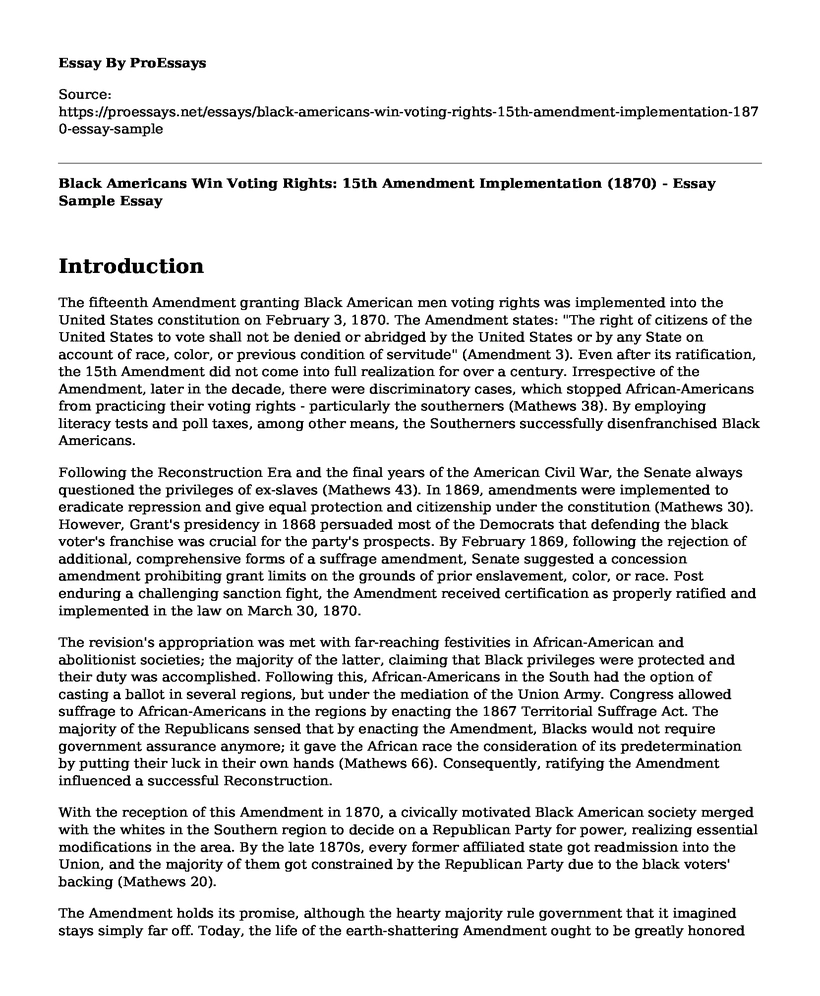Introduction
The fifteenth Amendment granting Black American men voting rights was implemented into the United States constitution on February 3, 1870. The Amendment states: "The right of citizens of the United States to vote shall not be denied or abridged by the United States or by any State on account of race, color, or previous condition of servitude" (Amendment 3). Even after its ratification, the 15th Amendment did not come into full realization for over a century. Irrespective of the Amendment, later in the decade, there were discriminatory cases, which stopped African-Americans from practicing their voting rights - particularly the southerners (Mathews 38). By employing literacy tests and poll taxes, among other means, the Southerners successfully disenfranchised Black Americans.
Following the Reconstruction Era and the final years of the American Civil War, the Senate always questioned the privileges of ex-slaves (Mathews 43). In 1869, amendments were implemented to eradicate repression and give equal protection and citizenship under the constitution (Mathews 30). However, Grant's presidency in 1868 persuaded most of the Democrats that defending the black voter's franchise was crucial for the party's prospects. By February 1869, following the rejection of additional, comprehensive forms of a suffrage amendment, Senate suggested a concession amendment prohibiting grant limits on the grounds of prior enslavement, color, or race. Post enduring a challenging sanction fight, the Amendment received certification as properly ratified and implemented in the law on March 30, 1870.
The revision's appropriation was met with far-reaching festivities in African-American and abolitionist societies; the majority of the latter, claiming that Black privileges were protected and their duty was accomplished. Following this, African-Americans in the South had the option of casting a ballot in several regions, but under the mediation of the Union Army. Congress allowed suffrage to African-Americans in the regions by enacting the 1867 Territorial Suffrage Act. The majority of the Republicans sensed that by enacting the Amendment, Blacks would not require government assurance anymore; it gave the African race the consideration of its predetermination by putting their luck in their own hands (Mathews 66). Consequently, ratifying the Amendment influenced a successful Reconstruction.
With the reception of this Amendment in 1870, a civically motivated Black American society merged with the whites in the Southern region to decide on a Republican Party for power, realizing essential modifications in the area. By the late 1870s, every former affiliated state got readmission into the Union, and the majority of them got constrained by the Republican Party due to the black voters' backing (Mathews 20).
The Amendment holds its promise, although the hearty majority rule government that it imagined stays simply far off. Today, the life of the earth-shattering Amendment ought to be greatly honored by keeping in mind that the battle continues.
Generally, even though the Amendment held its promise, the reliable democratic system it imagined, stays off. The Amendment, which was sanctioned in under a year, made it unlawful to "deny" or "shorten" the voting privilege "under the past state of bondage, color, or race" and enabled Congress to enact the new rule. Before long, Black individuals started casting a ballot in the South as well as all over the nation. They were elected into government offices and were even asked to represent Americans in the House of Senate.
Therefore, on the sesquicentennial of the fifteenth Amendment, Americans should commend the significant advancement made since the founding of the nation. Although, they ought to similarly think about the rough course to that growth - and recognize that there is a lot more to be done.
Works Cited
Amendment, Fourteenth. "United States Constitution. "Arriving at these decisions, the court had to (1791). http://dev.texaspolitics.utexas.edu/archive/html/cons/features/0402_01/US.pdf
Mathews, John Mabry. Legislative and Judicial History of the Fifteenth Amendment. Vol. 27. The Lawbook Exchange, Ltd., 2001.
Cite this page
Black Americans Win Voting Rights: 15th Amendment Implementation (1870) - Essay Sample. (2023, May 18). Retrieved from https://proessays.net/essays/black-americans-win-voting-rights-15th-amendment-implementation-1870-essay-sample
If you are the original author of this essay and no longer wish to have it published on the ProEssays website, please click below to request its removal:
- Whether or Not to Build The Border Wall - Essay Sample
- Dacosta's Article on the "Audacity of Canada 150" Review
- Essay Sample on Corporate Policies
- Essay on US Constitution's Appropriation Bill: Effective Control of Government Funds
- Democratic Party: Weakness or Strength? - Essay Sample
- The President: Powers & Responsibilities Under the US Constitution - Essay Sample
- King Henry : The Great King of England Who Defined Foreign Policy - Free Paper Example







